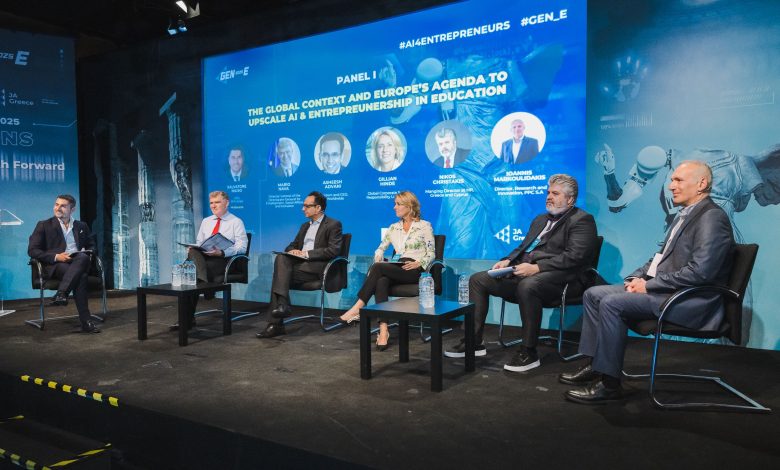
A Continent on the Clock
Europe is facing what Brussels has called a one-year deadline to retrain its workforce for the age of artificial intelligence. According to the European Centre for the Development of Vocational Training (Cedefop), over 60% of European workers will require additional training to cope with AI’s impact, either immediately or within the next twelve months.
In response, ten European countries have taken unprecedented collective action, launching one of the first-ever coordinated rollouts of AI entrepreneurship education in secondary schools.
This initiative, known as AI-ENTR4YOUTH, represents a shift from policy conversations to concrete classroom implementation, and marks a defining moment in how Europe is preparing its next generation for a rapidly evolving digital economy.
Coordinated by JA Europe and supported by Intel and the European Commission, the AI-ENTR4YOUTH programme is an applied education model that integrates AI concepts with entrepreneurial thinking. Rather than teaching AI as an abstract or purely technical discipline, it places innovation and problem-solving at the core of learning.
Recognised by the World Economic Forum as one of the world’s top eight AI education initiatives, the programme has already reached 12,000 students and is projected to impact 30,000 by 2026.
Its footprint spans ten nations, from Italy, Portugal, and Spain to Albania, Bulgaria, the Czech Republic, France, Greece, Romania, and Ukraine, making it one of the first systemic, cross-national implementations of AI and entrepreneurship education in Europe.
Bridging the AI Skills Divide
The European Commission has been vocal about the urgency of closing the continent’s widening skills gap. “We asked Cedefop to evaluate the impact of AI, and they found that over 60% of European workers will require additional training to cope with AI’s impact, either immediately or within the next year,” said Mario Nava, Directorate-General for Employment, Social Affairs and Inclusion at the European Commission.
This finding underscores the challenge facing governments, educators, and industries: Europe cannot remain competitive in the global AI economy without a population that can build, understand, and ethically apply the technology. The AI-ENTR4YOUTH programme directly responds to that need by equipping students with both technical and entrepreneurial competencies.
At the heart of AI-ENTR4YOUTH is a hands-on, project-based approach that transforms abstract AI concepts into tangible learning experiences. Students define real-world problems, build AI-driven solutions, and refine them through business modeling and pitching. Modules include data literacy, AI ethics, no-code AI tools, computer vision, Python programming, and even mathematics for AI — a comprehensive framework aligned with both EU and OECD education standards.
For students like Ajsel Budlla from Albania, the experience has been transformative. “Initially, building an AI model seemed unimaginable. But once you start working hands-on, you quickly realize it’s achievable, and the results make you proud,” she said. Her startup, PulsePal, which monitors vital signs in real time for rural patients, won the Code Week Digital Innovation Award for its social impact.
Teachers at the Core of Change
Behind the success of AI-ENTR4YOUTH is a recognition that teachers are central to education reform. JA Europe’s Deputy CEO, Diana Filip, highlighted the need to co-create the curriculum with educators: “It was essential to tailor the content to what teachers needed and to figure out how to effectively combine the AI and entrepreneurship modules.”
That collaborative approach has allowed for consistent scaling across diverse education systems. In Italy alone, JA Europe’s broader work has reached more than one million students, involving over 15,000 teachers and 10,000 business volunteers. Similar growth patterns are emerging across Spain, Portugal, and the Balkans, illustrating how localized adaptation and teacher readiness determine national progress.
Europe’s education systems often move slower than technological change, but the AI-ENTR4YOUTH model suggests a new pathway, one where policy frameworks and classroom practice evolve together.
To accelerate this alignment, the European Commission, in collaboration with the OECD and endorsed by the G7, has launched a draft Artificial Intelligence Literacy Framework for primary and secondary schools.
This framework seeks to standardise AI learning outcomes across the continent, ensuring students not only understand how AI works but can apply it responsibly and creatively. According to Francesca Matieri, Head of Education at JA Italy, “Integrating AI and entrepreneurship in school isn’t just about adding coding classes; it’s about reshaping our entire approach to education.”
The impact of this paradigm shift is already visible. At Gen-E 2025, Europe’s largest youth entrepreneurship festival held in Athens, students from over 40 countries showcased AI-powered solutions tackling challenges from remote healthcare to sustainable farming. The projects reflected not only technical capability but also social responsibility which is a core tenet of Europe’s vision for ethical AI.
As Salvatore Nigro, CEO of JA Europe, noted: “AI-ENTR4YOUTH proves young people can do more than use AI; they can build with it, question it, and apply it for public good. They’re not only future consumers of AI. They’re future creators.”
Scaling such initiatives remains a challenge. Education systems differ, funding varies, and teacher capacity is uneven across Europe. Yet, as AI becomes integral to every industry, from agrifood to manufacturing, the call for scalable, practical AI education has never been louder. Through a partnership with EIT Food, the programme is already exploring how AI can transform agriculture and food systems, linking sustainability goals with digital innovation.
JA Europe is now inviting education ministries, innovation networks, and corporate partners to join the next expansion phase – a collective effort to make AI entrepreneurship a permanent fixture of Europe’s secondary education landscape.
The Road Ahead
Europe’s AI skills challenge cannot be solved through training alone. It requires a rethinking of how education connects to innovation, and how young people are empowered to shape, and not just survive, the technological transformation ahead.
The AI-ENTR4YOUTH initiative shows what’s possible when policy ambition meets grassroots implementation. As the one-year AI skills countdown continues, Europe’s response may well determine whether the continent leads or lags in the next phase of the digital revolution.




